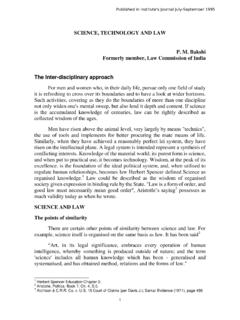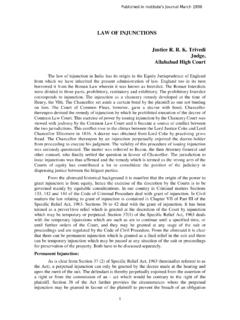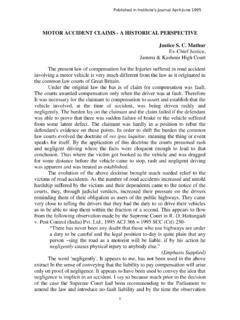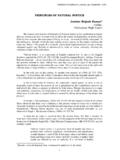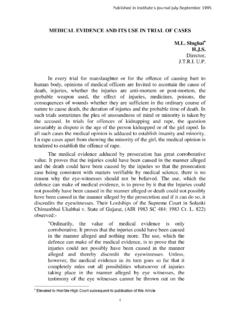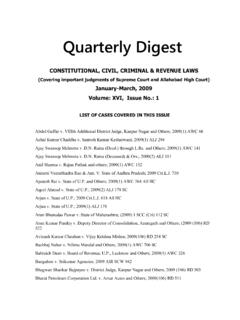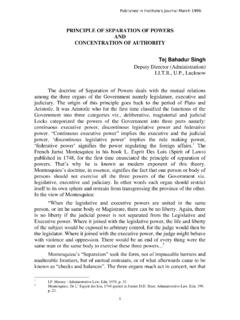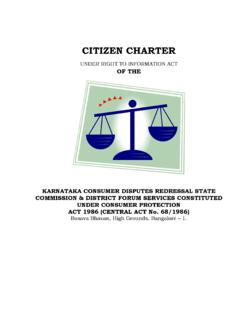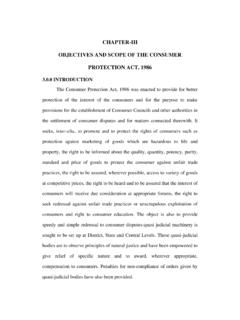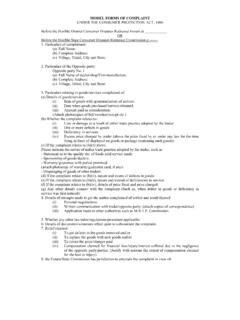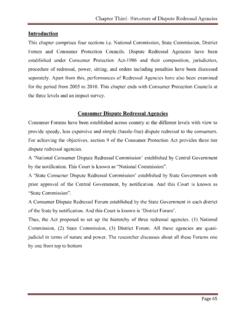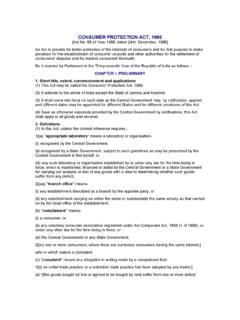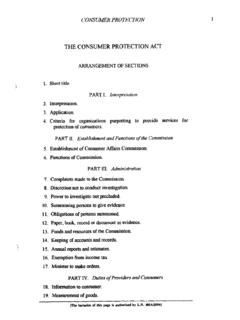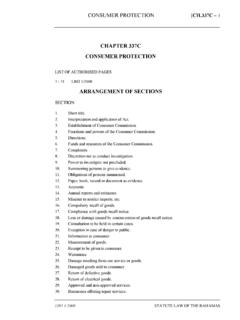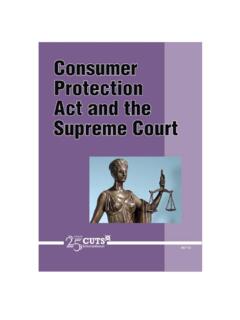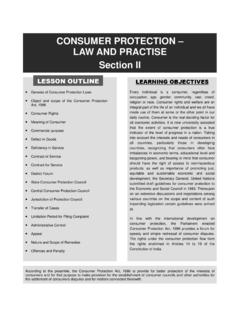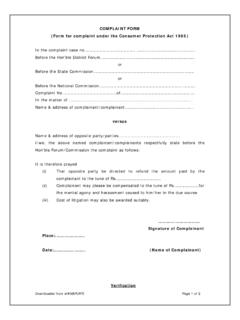Transcription of CONSUMER PROTECTION ACT, 1986 NEED FOR FURTHER …
1 1 CONSUMER PROTECTION ACT, 1986 need FOR FURTHER CHANGES, SOME SUGGESTIONS Justice Mehrotra President State- CONSUMER Disputes Redressal Commission CONSUMER PROTECTION Act, 1986 (here after, the Act) was enacted as an Act 'to provide for better PROTECTION of the Interests of consumers and for that purpose to make provision for the establishment of CONSUMER councils and other authorities for the settlement of Consumers disputes and for matters connected there with. It received the assent of the President of India on 24 December 1986 and was published in the Gazette of India Extraordinary on 24 December 1986.
2 The Act has been divided in four chapters and' consists of 31 sections. Chapter I, II and IV were enforced on 15 April 1987 while Chapter III came into force on 1 July 1987 in the whole of India except the State of Jammu and Kashmir. It has been amended twice. The first amendment was by the CONSUMER PROTECTION (Amendment) Act 1991 (Parliament Act of 1991) and the second by CONSUMER PROTECTION (Amendment) Act, 1993 (Parliament Act no. 50 of 1993) meaningful changes were brought in the Act particularly by the later amending Act which came into effect from 18th June 1993. However, in its actual working the Act is still deficient in various aspects.
3 A FURTHER amendment regarding them is the immediate need. 2. Some suggestions are, therefore, being made in this short write up. 3. A CONSUMER dispute can be brought before the CONSUMER disputes redressal agencies, namely, the District Forum, the State Commissions, and the National CONSUMER Disputes Redressal Commission by a CONSUMER in respect of goods and services by some of them in a representative capacity and by a recognised CONSUMER Association or the Central or a State Government. This is to be found in section 12 of the Act. 4. In the absence of a complaint the redressal agencies cannot intervene in a matter requiring action.
4 Power should be given to the National Commission and the State Commissions to initiate suo-motu proceedings in suitable cases where It Is found that restrictive or unfair trade practice was being adopted by a trader or goods had been offered for sale to public which will be hazardous to life and safety when used without proper " disclosure of information about the contents, manner and effect of its use in accordance with law requiring such disclosure. Similar power to initiate action should be given to these Commissions in respect of deficiency in service affecting the public in general.
5 4 YFPMWLIH MR -RWXMXYXI W .SYVREP %TVMP .YRI 2 5. The wide scope of the directions which can be given by the redressal agencies under Clause (e) to (h) of section 14 (1) of the Act would make it possible for the State Commissions and the National Commission to function effectively If they are empowered to initiate action suo-motu. Experience has shown that some times no one comes forward with a grievance before the redressal agencies in these matters and the redressal agencies feel helpless, as they cannot initiate action on their own. 6. The Jurisdiction of the High Court and the Courts subordinate there-to in respect of proceedings before the redressal Fora and the orders passed by them deserves to be excluded by appropriate amendment of Article 323-B of the Constitution as well as the Act.
6 It has been noticed over the years that sometimes proceedings before the redressal agencies get unusually delayed on account of orders made by the High Courts in matters relating to CONSUMER disputes and the object of the Act of ensuring expeditious redressal gets 7. The quantum leap in the number of causes brought before the redressal agencies has resulted in over -burdened dockets of the District Fora and the Commissions. While on the one hand it is indicative of CONSUMER awareness and their trust in these redressal agencies but on the other hand their hopes for early relief are belied due to huge pendency of cases and the consequential delay in their disposal.
7 8. Apart from the fact that absence of proper infrastructural facilities like trained and adequate staff, lack of proper space, library, furniture, stationery etc. contribute to these delays, the requirement in sub-section (2) and (2A) of section 14, that the President should be present of conduct each adjudicatory proceeding and be a signatory to every order passed therein results in cessation of its proceeding in his absence even of a casual nature. Besides, with the abnormal increase in the work load particularly In a large State like .it is physically impossible for the District fora or a State Commission to ensure disposal of cases brought before them within the reasonable time frame of 90 to 150 days envisaged under the rules framed for the purpose with only one set of persons working at any given time to hear them.
8 9. There is urgent need to enlarge the District Fora and the State Commissions by adding at least two more Members, one of whom should be a Civil Judicial Officer with sufficient experience and enabling the President to constitute Benches, with the presence of a Judicial Member therein being essential, to hear and dispose of the cases. Such a step is Imperative In the case of a big state like where there is huge influx of cases before the District fora and the State Commission in particular. 10. The Presidents of State commissions should be made Heads of Department with the necessary financial, administrative and other 3 ancillary powers to enable the President to ensure proper and speedy functioning of redressal agencies in a State.
9 11. The appointment of the President and Members of District Fora and State Commissions is mostly being made by the State Governments on a part time basis. It reduces the number of their working hours and in any case lessens the sense of accountability. The solution lies in making full time appointment, on appropriate terms and with adequate facilities for their functioning. Even If, for some reason, it in not possible to make full time appointment, proper facilities for their functioning and adequate amount of honorarium should be assured for them. Suitable amendment be made in section 10 (1) (b) and 10 (3) as well as 16 (1) (b) and 16 (2) of the Act.
10 12. The absence of power to grant an interim order in the nature of injunction in appropriate cases particularly those relating to discontinuance of some essential service robs the redressal agencies of their efficacy in many instances. The National Commission, the State Commissions and the District Forum should be conferred with this power specifically though, if considered essential, guidelines may be laid down in the Act like in the case of Order 39 or those contained in some Taxation Acts. Disobedience of the order should be treated as contempt of court and made punishable like-wise.


